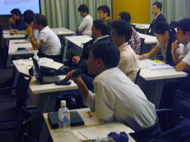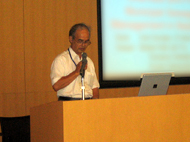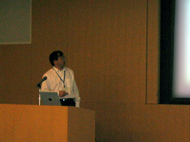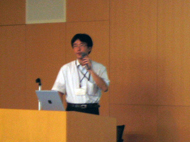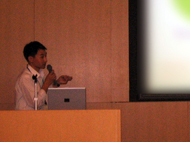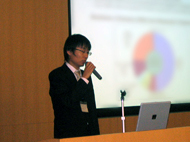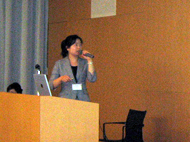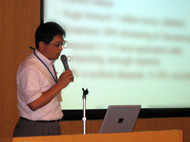Events
GCOE Young Researcher Symposium "Overview and Forecast of Municipal Sewage Sludge Management in Beijing of China"
Date: October 2, 2009
Venue: Global Hall JINYU (C1-2), Katsura Campus, Kyoto University, Japan
Organized by:
Kyoto University Global COE Program "Global Center for Education and Research on Human Security Engineering for Asian Megacities"
Co-organized by:
Support Program for Improving Graduate School Education "Int'tech Fusion Graduate School Engineering Education Program"
Number of attendants: about 33
Poster
Report 057
Outline
There are two purposes for this young researcher symposium. One is to gather the younger researchers together to exchange their research achievement about sewage sludge treatment and propose a possible resolution for the sewages sludge problem in Beijing of China. The other purpose is to offer some chance for our young researchers to have some experience of organizing a symposium.
Report
This young symposium is the fourth one hold by GCOE post doctor in this year. The five presentations are the current status of sewage sludge treatment in Beijing of China by Mr. Wang, Dewatering sewage sludge by Dimethy Ether presented by Assistant Professor Oshita, hydrothermal technology for sewage sludge presented by Lecture Qiao from China, Using sewage sludge as a biomass energy source by Dr. Miyamoto, Aerobic compost of sewage sludge by Associate Professor Gao from Chinese Academy of Sciences, and Reusing sewage sludge in cement industry by me. Different from the previous symposiums, I set a discussion part and a review after all the presentations. There two points we concluded from the discussion session. First is that accordant with 3R principles, we have to think of methods to reduce the amount of sewage sludge, and then we have to consider reuse and recycling technologies depending on different place and time. The second is that sewage sludge had better be recycled as resource than as energy and composting might be a relatively acceptable technology for Beijing in China. At last, Associate Professor Takaoka gave us a comprehensive review.
